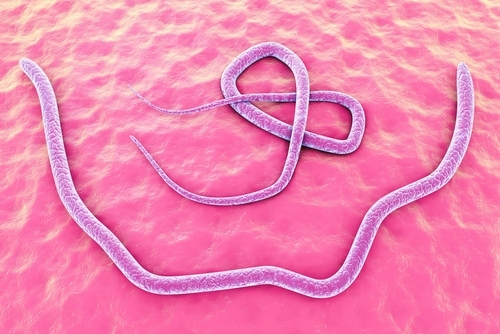Ascariasis affecting 10% of developing world population
UNI Jun 19, 2018
Ascariasis is an infection of the small intestine caused by Ascaris lumbricoides, a large roundworm and according to the World Health Organization (WHO), the eggs of the worm are found in soil contaminated by human faeces or in uncooked food contaminated by soil containing eggs of the worm.

A person becomes infected after accidentally swallowing the eggs. The eggs hatch into larvae within the person's intestine. The larvae penetrate the intestine wall and reach the lungs through the blood stream. They eventually get back to the throat and are swallowed.
In the intestines, the larvae develop into adult worms. The female adult worm which can grow to over 30cm in length, lays eggs that are then passed into the faeces.
If soil is polluted with human or animal faeces containing eggs the cycle begins again. Eggs develop in the soil and become infective after 2-3 weeks, but can remain infective for several months or years. Children are infected more often than adults, the most common age group being 3-8 years. The infection is likely to be more serious if nutrition is poor. They often become infected after putting their hands to their mouths after playing in contaminated soil.
Eating uncooked food grown in contaminated soil or irrigated with inadequately treated wastewater is another frequent avenue of infection. The first sign may be the passage of a live worm, usually in the faeces. In a severe infection, intestinal blockage may cause abdominal pain, particularly in children. People may also experience cough, wheezing and difficulty in breathing, or fever.
Ascariasis is found worldwide. Infection occurs with greatest frequency in tropical and subtropical regions, and in any areas with inadequate sanitation. Ascariasis is one of the most common human parasitic infections. Up to 10 per cent of the population of the developing world is infected with intestinal worms – a large percentage of which is caused by Ascaris.
Worldwide, severe Ascaris infections cause approximately 60 000 deaths per year, mainly in children. Health education providing the following messages reduces the number of infected people: avoid contact with soil that may be contaminated with human faeces; wash hands with soap and water before handling food; wash, peel or cook all raw vegetables and fruits; protect food from soil and wash or reheat any food that falls on the floor.
The availability of water for use in personal hygiene as well as proper disposal of human faeces will also reduce the number of cases.
Where wastewater is used for irrigation waste stabilization ponds and some other technologies are effective in decreasing transmission due to food grown in contaminated soil. Infected individuals (and domestic animals) should be treated with medicine to reduce disease transmission. Ascariasis can be effectively treated with mebendazole or pyrantel pamoate.
-
Exclusive Write-ups & Webinars by KOLs
-
Daily Quiz by specialty
-
Paid Market Research Surveys
-
Case discussions, News & Journals' summaries